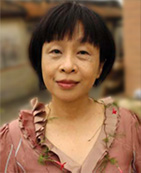Li Ang
Biography
Li Ang (real name 施叔端 - shi1 shu1 duan1) was born on April 7, 1952, in the town of鹿港 (Lu4Gang3), 彰化 (Zhang1 hua4) County, Taiwan. A graduate of the philosophy department from the Chinese Culture University, she received a master’s degree in drama at University of Oregon. Under the influence of her older sisters 施淑 and施叔青(shi1 shu2 , shi1 shu2 qing1) who are also authors, Li Ang picked up an interest in writing. By the age of sixteen, she published her first short story “Flower Season,” which quickly increased her stature in Taiwan’s literary circles. Most of her novels revolve around the themes of modern man’s issues of love and sexual relations, while describing society’s transforming view of gender psychology and ethics with young people. Li Ang came to the United States to pursue her advanced studies and then returned to Taiwan to teach at the Chinese Culture University. The Butcher’s Wife, a novella published in 1983, caused controversy within Taiwan’s literary circles and established Li Ang’s status and position. The novella also gained the attention of various international scholars, including Fujii Shozo, a professor at Tokyo University, and Kenzaburo Oe, recipient of the Nobel Literary prize. Fujii Shozo greatly admired Li Ang since the beginning of the 1990s. Thus, he has consistently translated a great deal of her works into Japanese and published them in Japan. The Butcher’s Wife has been translated into more than 10 different languages, including English, French, German, Italian, Japanese, Dutch, Swedish, Korea.
Among Taiwan’s third-generation writers, Li Ang is the most controversial woman writer. She experienced a great deal of attention and dispute regarding the causes and origins of the chosen subject matter in her novels. Since the The Secular World novel series was published, Li Ang’s novels have focused on the bald descriptions of sexuality; the themes of sexuality and relevance of ethics questions have a strong presence in her early writing. Recently Li Ang has begun to examine the intertwining of gender and politics in her writing, and it has opened up new dimensions of gender writing in literature. This approach has caused even more controversy in literary circles. In one interview, Li Ang explained her view on literature: “Literature’s final purpose is to depict human nature, and human nature has been restricted by society, so I am willing to explore and provoke the influences of humanity’s problems from society’s restrictions.” In 2004, Li Ang received “The Chevalier de L’ordre des Arts des Lettres,” awarded to commend her literary accomplishments from France’s Minister of Culture and Communication. Li Ang continues to break new ground of literary reflection, creating a new space of questions involving female sexuality. She not only contributed greatly to the development of Taiwan’s literature, but also promoted the image of Asian women’s literature in the international literary scene.





